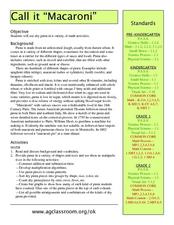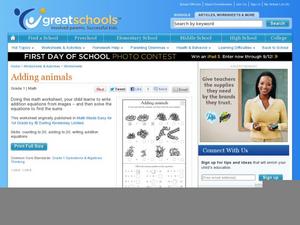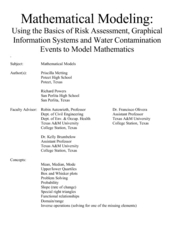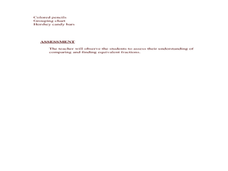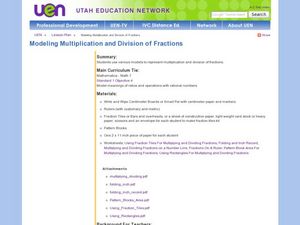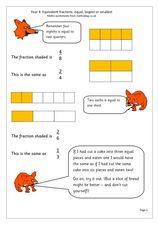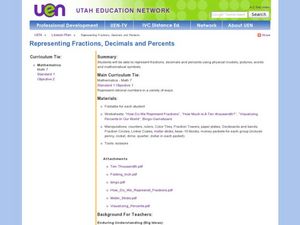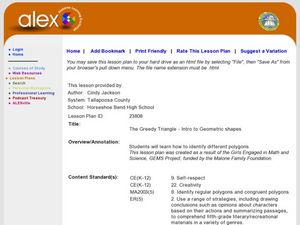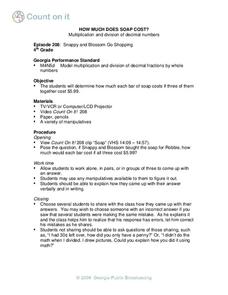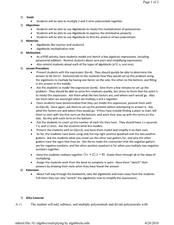Curated OER
Visualizing Skip Counting by 2
Drawing pictures to solve math problems is not only a good problem solving strategy, it's also mathematical modeling. First graders read six basic word problems that have them skip count by twos to find the answer. They draw pictures in...
Curated OER
Call it "Macaroni"
Who knew there were so many fun educational opportunities featuring pasta? Scholars read a brief informational text about the history of pasta (note that "macaroni" is spelled two different ways, so address this if kids are reading...
Alabama Learning Exchange
Ice Fishing is for the Birds
Approach addition with young mathematicians in an engaging way through this penguin-inspired activity. In small groups, scholars think about times they have used addition in their real lives (there are some suggestions given), then watch...
Curated OER
Length
Without using a ruler, learners estimate the relative length of various lines in these three scenarios. The first two are set up as maps, with learners determining the shortest and longest distances from one position to another. The last...
Curated OER
Adding Animals
Writing equations from images helps young mathematicians grasp addition, especially when they get to look at cute animals as they do it. There are six number sentences here, each illustrated with a set of animals corresponding to...
Curated OER
Subtracting
Help kids visualize subtraction by assigning these sets of objects for them to subtract. They examine an example before completing the seven equations on their own. For each, learners cross out the subtrahend value and count the...
Curated OER
Making 10 Packs Worksheet
The soup factory is missing cans in its 10-packs! Scholars take on the challenge as they figure out how many more cans are required to complete these four 10-packs. Encourage them to draw the extra cans for added comprehension. It would...
Curated OER
Mathematical Modeling
Study various types of mathematical models in this math lesson plan. Learners calculate the slope to determine the risk in a situation described. They respond to a number of questions and analyze their statistical data. Then, they...
Curated OER
Tens and Ones Guided Lesson
Understanding place value will open up a world of math comprehension for your learners. There are three parts to this worksheet, all with the objective of revealing the decomposition of numbers into tens and ones. First, scholars examine...
Curated OER
Spin a Window!
How many windows does this school bus have? If your class is new to counting, this will be a fun way to get them some practice. Cut out and laminate the spinner template and set it up to spin (instructions written out if you need them)....
Curated OER
Hershey Bar Equivalent Fractions
Fourth and fifth graders explain how to use equivalent fractions. They recognize which fractions are equivalent. Pupils find equivalent fractions.
Curated OER
Cuisenaire Multiplication
Cuisenaire Rods give learners an excellent strategy as they learn about multiplication. How many ways can they make the same product? Using a target product, learners lay out rods to achieve that number through various factors. This...
Curated OER
Match the Number Sentence!
Matching number sentences to their visual equivalents may seem easy, but there is a trick here to keep your learners thinking about math properties. As they examine the numerical forms of six addition problems, they must utilize the...
Curated OER
Decimals Decide Olympic Champions
The class discovers how a decimal can make all the difference in the Olympics. As they learn about decimal place values, they compare and contrast data and demonstrate decimal values using manipulatives.
Curated OER
Modeling Multiplication and Division of Fractions
Create models to demonstrate multiplication and division of fractions. Using fraction tiles to model fractions, pupils explore fractions on a ruler and use pattern blocks to multiply and divide. They also create number lines with fractions.
Maths Blog
Equivalent Fractions: Equal, Largest, or Smallest
Elementary mathematicians begin by reading a one-page text that explains how to compare fractions. They solve two problems in which they must circle equal fractions in a set. They then solve four problems where a set of five fractions is...
Curated OER
Representing Fractions, Decimals, and Percents
In this fractions, decimals, and percents lessons, students explore various methods of representing fractions. They demonstrate situations that represent rational numbers. Students create a foldable exploring fractions, decimals and...
Curated OER
Study Buddies: Relating Multiplication And Division
These acitivities are designed for two! With a partner, problem solve and calculate the answers to fifteen word problems or mathematical equations. Scaffolding and coaching are included, and as an extension learners are prompted to...
Curated OER
Measuring Mixed Numbers
Mixed numbers can be added conceptually, algorithmically, and physically. Have the class visualize mixed numbers by adding fraction bars together. They then discover the algorithmic process that simplifies adding mixed numbers. Finally,...
Curated OER
The Greedy Triangle-Intro to Geometric Shapes
In this geometry lesson, learners read The Greedy Triangle and use geoboards to construct geometric shapes. They identify the number of sides and angles each shape has.
Curated OER
How Much Does Soap Cost?
Explore multiplication and division using real life problems, including how to find the cost of soap per bar. Individuals or small groups work to find answers. They then share with the class how they found their answer.
Curated OER
Mouse Count
How many ways can you arrange ten mice? After listening to the story, Mouse Count by Ellen Stone Walsh, it's the young scholars' turn to figure out how their mice can be organized, with some inside a jar and some out. Using visual and...
Curated OER
Students Multiply Polynomials
Factor polynomial functions that have two and three terms. Using Algeblocks, your class will create models to show their understanding of these concepts.
Curated OER
Drop it or not?
Students explore fractions. In this fraction lesson, students play an interactive game and use manipulatives to practice working with fractions.



